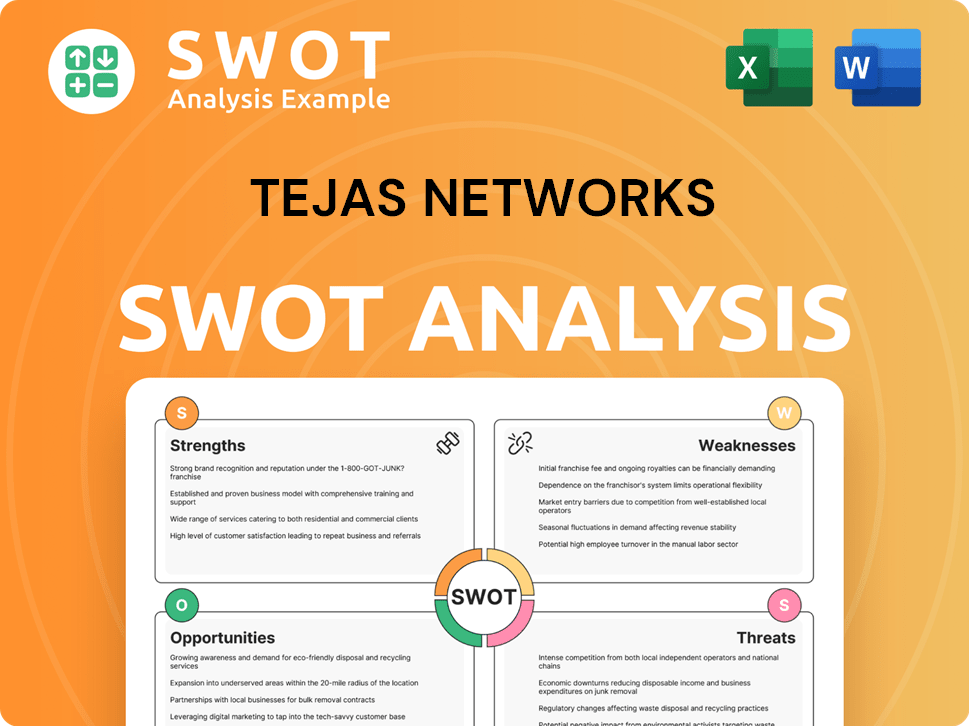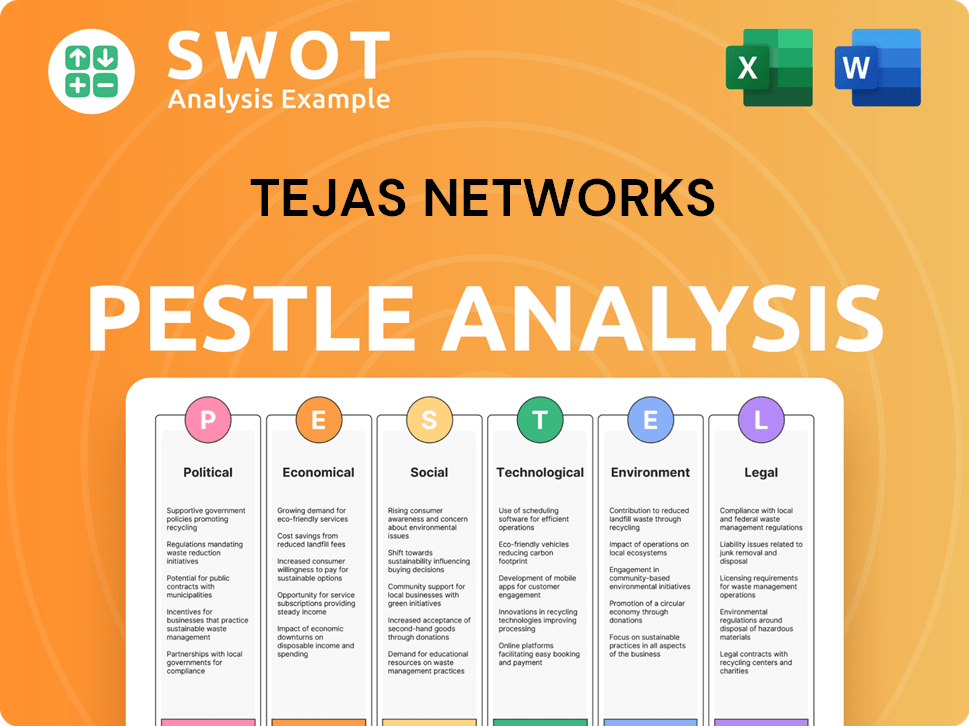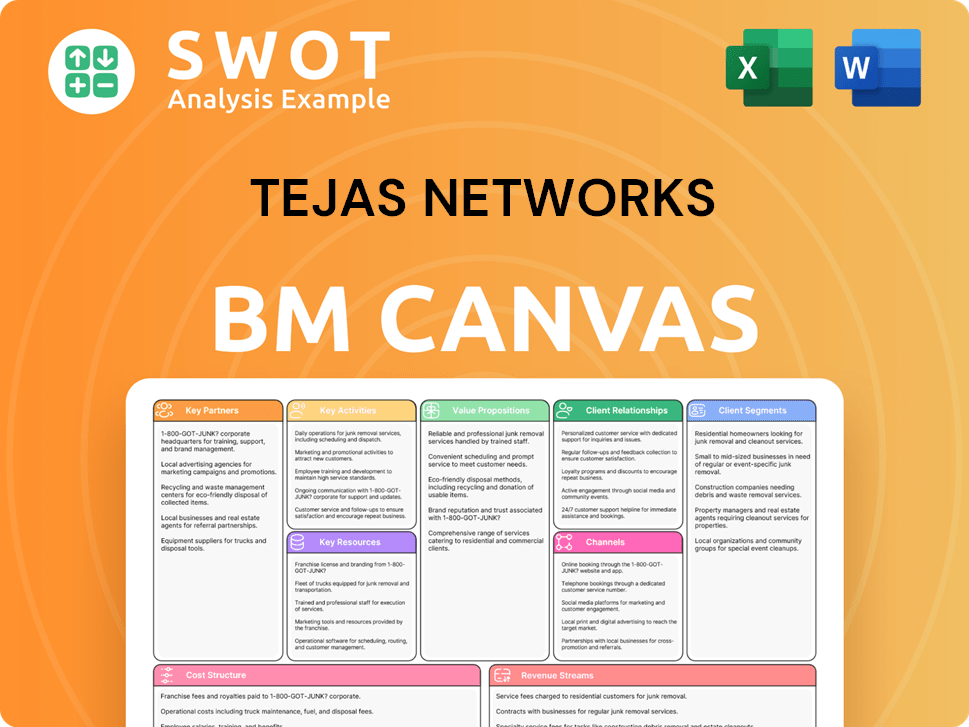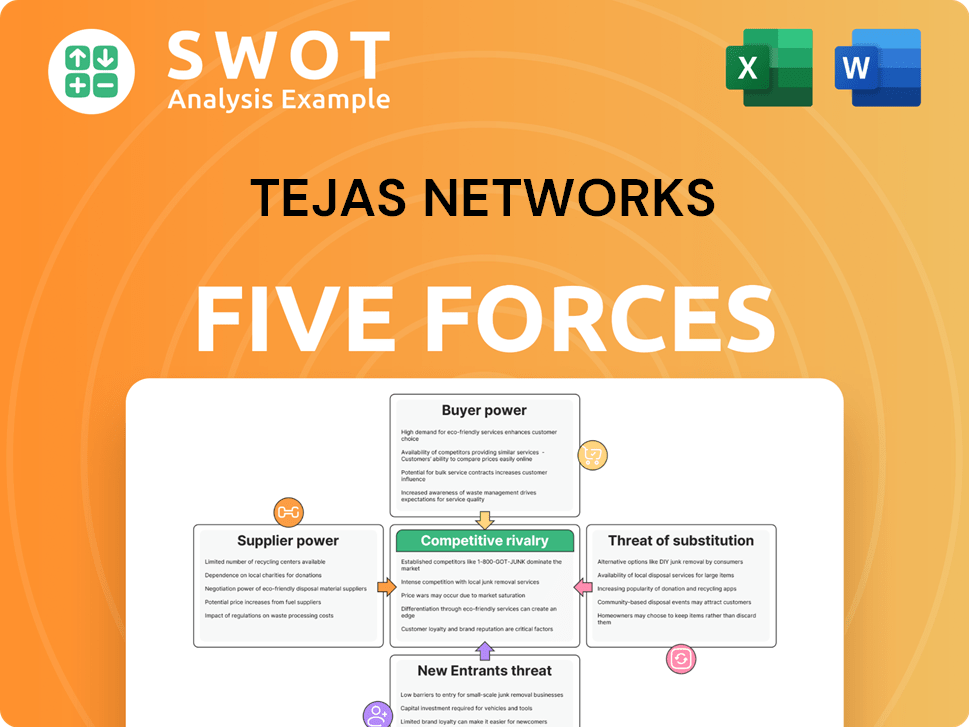Tejas Networks Bundle
Decoding Tejas Networks: Who Are They Serving?
In the fast-paced world of telecommunications, understanding Tejas Networks SWOT Analysis is crucial for any investor or industry observer. But who exactly is the company targeting, and what drives its strategic decisions? This exploration delves into the core of Tejas Networks' business, examining its customer demographics and the evolution of its target market.

From its inception, Tejas Networks has navigated a dynamic landscape, adapting its networking solutions to meet evolving demands. This market analysis reveals how the company has broadened its customer profile, moving beyond traditional telecom operators to include government entities and defense organizations. Understanding the intricacies of Tejas Networks' customer segmentation and its approach to customer acquisition is key to grasping its growth trajectory and competitive positioning within the industry.
Who Are Tejas Networks’s Main Customers?
Understanding the customer demographics and target market of Tejas Networks is crucial for analyzing its business strategy. The company primarily operates within the B2B (business-to-business) sector, focusing on specific customer segments rather than individual consumers. This strategic approach allows for tailored solutions and deeper market penetration within key industries.
The core of Tejas Networks' business revolves around providing advanced networking solutions. This focus dictates its target market, which includes entities requiring robust and scalable communication infrastructure. Analyzing the customer profile reveals a concentration on large enterprises and governmental bodies that demand high-performance, secure, and reliable network capabilities.
The company's target market is primarily composed of telecom service providers, government entities, defense organizations, and utility companies. These segments represent the primary customer segments, each with specific needs and requirements that Tejas Networks aims to fulfill. This strategic focus allows for a more targeted approach to sales and product development.
Telecom service providers form a significant portion of Tejas Networks' revenue. These companies utilize Tejas's optical and data networking products to build and expand their communication infrastructure. Their needs include high-speed data and voice transmission capabilities.
Government entities and defense organizations are another critical segment. They require secure, high-capacity communication networks for strategic and operational purposes. This segment often demands specialized solutions to meet stringent security protocols.
Utility companies also represent a growing segment. They integrate communication networks for smart grid initiatives and operational efficiency. This includes the deployment of advanced networking solutions to manage and optimize energy distribution.
Tejas Networks is expanding its focus to include a broader range of enterprises that require sophisticated networking solutions. This shift is driven by the increasing digitalization across various sectors and the growing demand for high-bandwidth connectivity.
The evolution of Tejas Networks' target market reflects broader trends in the technology sector. The company has adapted its offerings to meet the specific demands of each segment, ensuring its solutions align with the unique needs of its clients. This includes providing tailored solutions for government and defense sectors.
- Telecom Service Providers: Require high-speed data and voice transmission infrastructure.
- Government and Defense: Demand secure and high-capacity communication networks.
- Utility Companies: Integrate networks for smart grid initiatives and operational efficiency.
- Enterprise Customers: Seeking sophisticated networking solutions for digital transformation.
Tejas Networks SWOT Analysis
- Complete SWOT Breakdown
- Fully Customizable
- Editable in Excel & Word
- Professional Formatting
- Investor-Ready Format

What Do Tejas Networks’s Customers Want?
Understanding the customer needs and preferences is crucial for any company, and for Tejas Networks, this involves a deep dive into the requirements of its diverse customer base. The primary focus revolves around providing reliable, scalable, and cost-effective networking solutions. This approach allows Tejas Networks to tailor its offerings to meet the specific demands of each segment within its target market.
The key drivers for Tejas Networks' customers include the need for high-speed broadband, support for 5G technology, and minimal network downtime. Purchasing decisions are heavily influenced by long-term investment cycles, technical specifications, and the need for future-proof solutions. The company's success hinges on its ability to address these critical needs, ensuring customer satisfaction and loyalty. This customer-centric approach is vital for maintaining a competitive edge in the networking industry.
Tejas Networks addresses common pain points such as upgrading legacy infrastructure and managing increasing data traffic. The company develops advanced optical and data networking products that offer high bandwidth and enhanced security features. This focus on innovation and customer-specific solutions helps the company to maintain a strong market position. The company's ability to adapt to changing market dynamics and customer demands is a key factor in its continued success.
Telecom service providers need high-speed broadband and 5G support. They require minimal network downtime to provide reliable services. Their purchasing decisions are driven by long-term investments and technical specifications.
Government and defense entities prioritize secure and resilient networks. They need high-capacity networks for critical infrastructure. Their motivations include national security and digital transformation.
Utility companies require networking solutions for smart grids and remote monitoring. They need reliable and efficient data transfer. Operational efficiency is a key priority for them.
Customers consider the total cost of ownership (TCO). Network security is a critical factor in their decisions. Ease of integration with existing systems is also important.
Tejas Networks helps upgrade legacy infrastructure. The company assists in managing increasing data traffic. It secures networks against cyber threats.
Product development is influenced by market trends. Direct customer engagement helps tailor solutions. The company provides specialized equipment for specific needs.
Tejas Networks focuses on providing reliable, scalable, and cost-efficient networking solutions. This approach allows the company to meet the specific demands of its diverse customer base. The company's success depends on its ability to address these needs effectively.
- Customer Demographics: The target market includes telecom service providers, government and defense entities, and utility companies.
- Market Analysis: Tejas Networks conducts market analysis to understand customer needs.
- Networking Solutions: The company offers advanced optical and data networking products.
- Customer Profile: The customer profile includes long-term investment cycles and stringent technical specifications.
Tejas Networks PESTLE Analysis
- Covers All 6 PESTLE Categories
- No Research Needed – Save Hours of Work
- Built by Experts, Trusted by Consultants
- Instant Download, Ready to Use
- 100% Editable, Fully Customizable

Where does Tejas Networks operate?
The geographical market presence of Tejas Networks is primarily focused on India and other emerging markets. The company strategically targets regions in South Asia, Southeast Asia, Africa, and the Middle East. This strategic approach allows it to capitalize on the growing demand for advanced communication infrastructure in these areas.
India serves as the strongest market for Tejas Networks, where it holds a significant market share. The company provides optical and data networking solutions to major telecom service providers, government bodies, and defense organizations within the country. This strong domestic base is complemented by its expanding international presence.
Tejas Networks is actively expanding its footprint in developing economies. This expansion is driven by the increasing need for new and upgraded communication infrastructure in these regions. The company's focus on cost-effectiveness and adaptability allows it to cater to diverse network requirements, from large urban deployments to remote rural connectivity.
Tejas Networks conducts thorough market analysis to understand the specific needs of each region. This includes assessing infrastructure requirements and regulatory landscapes. The company's ability to adapt its offerings to diverse market conditions is a key factor in its success.
The customer profile varies across regions, with emerging markets often prioritizing cost-effectiveness and ruggedness. Tejas Networks addresses these needs by providing scalable and adaptable solutions. The company's customer acquisition strategy involves collaborations with local system integrators and service providers.
The company's geographic market includes India, Africa, Southeast Asia, and the Middle East. These regions are experiencing increasing digitalization and investment in telecom infrastructure. Tejas Networks leverages India's 'Make in India' initiative to position itself as a reliable supplier for global markets.
Tejas Networks offers comprehensive networking solutions, including optical and data networking products. These solutions cater to the specific needs of telecom service providers, government bodies, and defense organizations. The company's focus on innovation and adaptability ensures it remains competitive in these markets.
The company's approach involves tailoring its products and services to meet the unique demands of each region. For example, in emerging markets, there's a greater emphasis on equipment durability and cost-effectiveness. Tejas Networks addresses these needs by offering scalable and adaptable solutions. Recent expansions have focused on leveraging India's 'Make in India' initiative to position itself as a reliable supplier for global markets, particularly those seeking alternatives to traditional Western or Chinese vendors. To learn more about the company's history and evolution, you can read the Brief History of Tejas Networks.
Tejas Networks Business Model Canvas
- Complete 9-Block Business Model Canvas
- Effortlessly Communicate Your Business Strategy
- Investor-Ready BMC Format
- 100% Editable and Customizable
- Clear and Structured Layout

How Does Tejas Networks Win & Keep Customers?
Customer acquisition and retention are critical strategies for Tejas Networks's success, especially within the networking solutions sector. The company's approach is tailored to its business-to-business (B2B) model, focusing on direct sales, strategic partnerships, and superior product quality. These strategies are designed to build lasting relationships with clients and ensure sustained growth in the competitive market.
The company's customer acquisition strategy is multifaceted, with a strong emphasis on direct sales teams equipped with deep technical expertise. These teams engage directly with target clients, including telecom service providers, government entities, and large enterprises. Market analysis is a continuous process, helping the company understand customer needs and refine its offerings. Strategic partnerships are also vital, particularly in international markets, aiding market penetration and providing local expertise.
Customer retention is a core focus, driven by product reliability and strong after-sales support. The company aims to foster long-term relationships by ensuring high customer satisfaction through timely issue resolution, regular software updates, and proactive maintenance. Customer data and CRM systems are essential for managing client relationships and identifying opportunities for upselling or cross-selling. This approach helps reduce customer churn and increases customer lifetime value.
Direct sales teams are crucial for acquiring customers. These teams possess deep technical knowledge and industry insights, enabling them to address complex client needs. This approach is particularly effective in the B2B environment where personalized engagement is vital.
Strategic partnerships are key, especially in international markets. Collaborations with local system integrators and distributors help navigate regional dynamics. These partnerships facilitate market entry and expand reach to new clients.
Customer retention depends on product reliability and after-sales support. The company focuses on timely issue resolution and proactive maintenance. This commitment fosters long-term relationships and reduces churn.
CRM systems are used to manage client relationships and track project progress. These systems help identify opportunities for upselling and cross-selling. This data-driven approach enhances customer lifetime value.
These teams are crucial for engaging with telecom service providers and government entities. They possess specialized technical expertise. Their industry knowledge helps address the complex requirements of clients.
Participation in industry events and trade shows is a key strategy. This approach helps showcase products and capabilities. It also generates leads and builds brand awareness within target sectors.
Collaborations with local partners are vital for international expansion. These partnerships help navigate regional market dynamics and regulatory hurdles. They extend the company's reach to new clients.
Customer satisfaction is key to retention. This is achieved through reliable products and robust after-sales service. Timely issue resolution and software updates are critical.
CRM systems are used to manage client relationships and track projects. They help identify upselling and cross-selling opportunities. This data-driven approach is essential for customer retention.
Continuous innovation is essential for staying relevant. Market trends and customer feedback are continuously monitored. This helps refine the product roadmap and service offerings, impacting customer lifetime value.
Tejas Networks Porter's Five Forces Analysis
- Covers All 5 Competitive Forces in Detail
- Structured for Consultants, Students, and Founders
- 100% Editable in Microsoft Word & Excel
- Instant Digital Download – Use Immediately
- Compatible with Mac & PC – Fully Unlocked

Related Blogs
- What are Mission Vision & Core Values of Tejas Networks Company?
- What is Competitive Landscape of Tejas Networks Company?
- What is Growth Strategy and Future Prospects of Tejas Networks Company?
- How Does Tejas Networks Company Work?
- What is Sales and Marketing Strategy of Tejas Networks Company?
- What is Brief History of Tejas Networks Company?
- Who Owns Tejas Networks Company?
Disclaimer
All information, articles, and product details provided on this website are for general informational and educational purposes only. We do not claim any ownership over, nor do we intend to infringe upon, any trademarks, copyrights, logos, brand names, or other intellectual property mentioned or depicted on this site. Such intellectual property remains the property of its respective owners, and any references here are made solely for identification or informational purposes, without implying any affiliation, endorsement, or partnership.
We make no representations or warranties, express or implied, regarding the accuracy, completeness, or suitability of any content or products presented. Nothing on this website should be construed as legal, tax, investment, financial, medical, or other professional advice. In addition, no part of this site—including articles or product references—constitutes a solicitation, recommendation, endorsement, advertisement, or offer to buy or sell any securities, franchises, or other financial instruments, particularly in jurisdictions where such activity would be unlawful.
All content is of a general nature and may not address the specific circumstances of any individual or entity. It is not a substitute for professional advice or services. Any actions you take based on the information provided here are strictly at your own risk. You accept full responsibility for any decisions or outcomes arising from your use of this website and agree to release us from any liability in connection with your use of, or reliance upon, the content or products found herein.